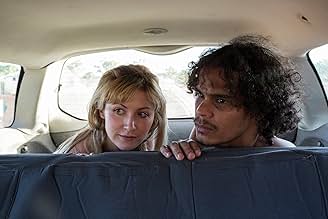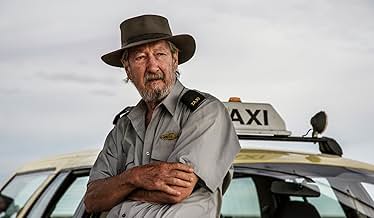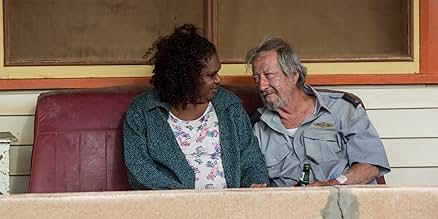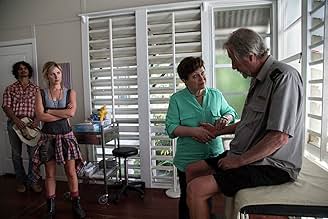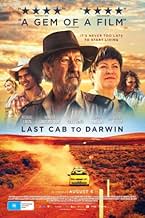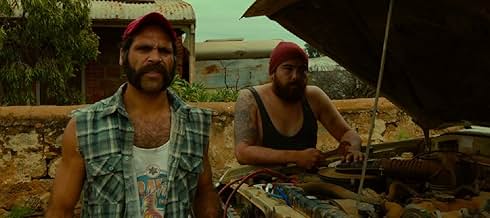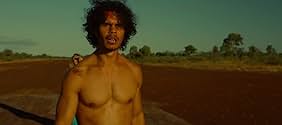AVALIAÇÃO DA IMDb
7,2/10
4,4 mil
SUA AVALIAÇÃO
Adicionar um enredo no seu idiomaWhen Rex, a Broken Hill cab driver, is told he doesn't have long to live, he sets out on an epic journey to Darwin in a bid to die on his own terms.When Rex, a Broken Hill cab driver, is told he doesn't have long to live, he sets out on an epic journey to Darwin in a bid to die on his own terms.When Rex, a Broken Hill cab driver, is told he doesn't have long to live, he sets out on an epic journey to Darwin in a bid to die on his own terms.
- Direção
- Roteiristas
- Artistas
- Prêmios
- 6 vitórias e 24 indicações no total
Ningali Lawford
- Polly
- (as Ningali Lawford-Wolf)
Avaliações em destaque
"Drink your beer and shut up" is the essence of male culture in Australia. "Mateship" is the term for it. Rex, a 70 year old cab driver from Broken Hill in New South Wales, finds – as he must have already felt for a long time - that mateship is a double edged sword. He is diagnosed with terminal stomach cancer and can't bring himself to tell his friends or the woman he secretly loves. "There's no one else," he tells his doctor. Instead he drives his cab 2,000 plus miles across the Australian outback to Darwin where there is a newly opened and experimental euthanasia clinic. "Why," asks the woman who might have been his wife "did you not tell me?!" "You never asked," answers Rex, matter-of-factly. Rex has never seen the sea, among other things, and his eyes are opened to new scenery and people. His nearness to death is an opportunity to reassess his life and, like Odysseus, for adventure.
While much of the film is drama and serious in nature, it is also light-hearted. A mechanic tells Rex to keep his fluids up while driving in the desert, and Rex promptly goes into the bar for beer. One theme is the plight of Australia's aborigines. Whites took away much of their culture and stories, and as a result, who they are. The acting is really wonderful, especially the lead who is a veteran of Australian films and television and well-loved for such roles for his entire life. I love the ornate and wonderful arts and crafts homes as well as the scenery of Australia. The film is loosely based on a true story. The only real drawbacks are that it is somewhat predictable and short. Seen at the Toronto International Film Festival 2015.
While much of the film is drama and serious in nature, it is also light-hearted. A mechanic tells Rex to keep his fluids up while driving in the desert, and Rex promptly goes into the bar for beer. One theme is the plight of Australia's aborigines. Whites took away much of their culture and stories, and as a result, who they are. The acting is really wonderful, especially the lead who is a veteran of Australian films and television and well-loved for such roles for his entire life. I love the ornate and wonderful arts and crafts homes as well as the scenery of Australia. The film is loosely based on a true story. The only real drawbacks are that it is somewhat predictable and short. Seen at the Toronto International Film Festival 2015.
10gallae
I saw this film yesterday, choosing it over both "Fantastic Four" and "The Man from UNCLE" and it was a good choice. The trailer - which I saw on tube - only gives you the basic scenario of the film, but NOT what it's about. I have to admit I chose it because it featured Michael Caton, who was also in another classic Aussie film *The Castle*. He, and the other actors in this film have been cast really well. I particularly like Ningali Lawford-Wolf as Polly, and Mark Coles Smith as Tilley.
The film made me laugh and cry, partly because it tapped into my own family history, But I loved the background to this story - the red and greens of the outback, the houses with tin roofs and rock fences - they remind me of Kalgoorlie where I lived at an early age . Also the film, which is based on a play by Reg Cribb, doesn't shy away from social issues that won't go away, but is ultimately uplifting in what it says.
The film made me laugh and cry, partly because it tapped into my own family history, But I loved the background to this story - the red and greens of the outback, the houses with tin roofs and rock fences - they remind me of Kalgoorlie where I lived at an early age . Also the film, which is based on a play by Reg Cribb, doesn't shy away from social issues that won't go away, but is ultimately uplifting in what it says.
One of the great Australian success stories of a very profitable 2015 for local films, Jeremy Sims Last Cab to Darwin scored over 7 million dollars in local box office receipts this year and garnered an equal share of critical and audience good will that will likely see it become a staple in collections of local film lovers for years to come.
Adapting Reg Cribb's successful stage play of the same name and casting Australian identity Michael Caton in the role that he portrayed in that very play, Sims has done a fine job at transplanting a play into a feature length film and his capturing of the dusty plains of outback Australia as Caton's dying cab driver and lonely soul Rex heads off on a road trip from South Australia's Broken Hill to Darwin is one of the films highlights.
But it's not all smooth sailing for Sim's as he finds trouble maintaining momentum in the film which starts off particularly strong and engaging but through a misguided and cliché ridden final act loses stem, particularly with a bunch of side characters that feel slightly underdeveloped and also far to "movie like" to feel real.
Caton delivers what could well be his finest ever moment as Rex a man we come to care for in a short period of time and Caton's experience with both comedy and drama serve him well as he balances a nice line between humour and pathos. Rex's journey (which is supposedly based around some true events) feels real and emotion filled but with the film itself set up for a 2 hour long trip, Rex's ride to be euthanized before cancer slowly kills him gets filled with Mark Coles Smith's (who sadly overplays) lost young man Tilly and Emma Hamilton's English ex-pat Julie's loving nurse and both these characters while at moments help the film along also take a little too much away from the film and it would've been nice to have seen them play smaller roles and Sims to have had more faith in Caton to carry the film along as he was seemingly more than up to the task.
One of the better feel good (and sad) Australian movies in some time, The Last Cab to Darwin would be an incredibly hard films to dislike and while it never breaks out into being an undeniably standout classic, its deserving of its warm reception and likely long standing place in the hearts of Australian movie goers that found themselves investing in this likable tale of one man's journey to find himself in world that seemingly passed him by.
3 ½ cat trees out of 5
Adapting Reg Cribb's successful stage play of the same name and casting Australian identity Michael Caton in the role that he portrayed in that very play, Sims has done a fine job at transplanting a play into a feature length film and his capturing of the dusty plains of outback Australia as Caton's dying cab driver and lonely soul Rex heads off on a road trip from South Australia's Broken Hill to Darwin is one of the films highlights.
But it's not all smooth sailing for Sim's as he finds trouble maintaining momentum in the film which starts off particularly strong and engaging but through a misguided and cliché ridden final act loses stem, particularly with a bunch of side characters that feel slightly underdeveloped and also far to "movie like" to feel real.
Caton delivers what could well be his finest ever moment as Rex a man we come to care for in a short period of time and Caton's experience with both comedy and drama serve him well as he balances a nice line between humour and pathos. Rex's journey (which is supposedly based around some true events) feels real and emotion filled but with the film itself set up for a 2 hour long trip, Rex's ride to be euthanized before cancer slowly kills him gets filled with Mark Coles Smith's (who sadly overplays) lost young man Tilly and Emma Hamilton's English ex-pat Julie's loving nurse and both these characters while at moments help the film along also take a little too much away from the film and it would've been nice to have seen them play smaller roles and Sims to have had more faith in Caton to carry the film along as he was seemingly more than up to the task.
One of the better feel good (and sad) Australian movies in some time, The Last Cab to Darwin would be an incredibly hard films to dislike and while it never breaks out into being an undeniably standout classic, its deserving of its warm reception and likely long standing place in the hearts of Australian movie goers that found themselves investing in this likable tale of one man's journey to find himself in world that seemingly passed him by.
3 ½ cat trees out of 5
Michael Caton has been a fixture on Australian screens since the 1970's thanks to TV shows like 'The Sullivans' and 'Packed to the Rafters'. His voice is quintessentially Aussie and his face and personality have made him a household name. His casting for this film is perfect and I can't even imagine another actor as Rex; so perfect is Caton, and such a gift for an actor who has mostly been the family uncle or grandad. Here he is, front and centre; stoic, three dimensional and instantly likable. Director Jeremy Sims, himself a TV and film actor, has elicited an award worthy performance from the veteran, but also helps young actor Mark Coles Smith as Tilly, make one of the year's best supporting turns. The camera just loves his wicked grin and his playful, easy charm. The film pulls no punches with some of the content surrounding both the indigenous characters such as Tilly, or the circumstances and realities of euthanasia. I was disappointed with Jacki Weaver here: she never looks or sounds comfortable with her character, and that is unfortunate as it is a linchpin to the film's trajectory, but Caton's 'Rex' is so unforgettable, that he carries even the weaker elements of the movie. Beautifully photographed and capturing the visceral parts of the landscape and the terrain, 'Last Cab To Darwin' is not a perfect film, but an enjoyable and significant one, and a rewarding one for its leading actor.
A widely recognised characteristic of Australian film is our capacity to find humour in almost any subject. When people from other places try to describe our national character, they use words like larrikin, irreverent, or iconoclastic, meaning we like to laugh at ourselves and the sacred cows in our patch. So how do you laugh at dying, let alone make an Aussie comedy out of a road film that has euthanasia as its destination?
Aussie icons Michael Caton and Jackie Weaver provide the larrikin mix of gravitas and humour needed to make a deadly serious issue bearable as we share the journey and the end-of-life issues facing the terminally ill cab driver Rex. He has never been outside Broken Hill and must drive 3,000 kms to Darwin to be the first person who is legally assisted to die by Weaver who plays a feminine version of Dr Death (as euthanasia advocate Philip Nitschke was called). Like in all road films, he crosses iconic landscapes and encounters bad things. He also meets some beautiful characters like the Pommie backpacker Julie who becomes his nurse, a mischievous Aboriginal Peter Pan-type called Tilly, and Polly, the Aboriginal neighbour and secret lover he left behind but calls regularly. The back story of our nation's inept relationship with the traditional owners of our land frames much of Rex's journey, just as it continues to frame our evolving national identity.
While it is an entertaining Aussie yarn, that's not its only purpose. Superb acting by Caton in particular brings you up close and very personal to the emotional and practical challenges of picking a time and place to die with dignity. The film can get heavy-handed in the way it loads political and moral messages into the story; for example, when Tilly yells at Rex "You think its brave to let someone else do your dying for you?" we are confronted with different ways of looking at assisted dying. Rex makes it to Darwin only to find medical and legal confusion, so things do not turn out as expected. For some, it's a distracting edit to have Rex back home in minutes when it took half the film to get there, but perhaps this reflects the truncation of time when the time has come. Be warned: this is a film that can mess with your head about the complex issue of assisted dying, but it's an Aussie gem well worth the effort.
Aussie icons Michael Caton and Jackie Weaver provide the larrikin mix of gravitas and humour needed to make a deadly serious issue bearable as we share the journey and the end-of-life issues facing the terminally ill cab driver Rex. He has never been outside Broken Hill and must drive 3,000 kms to Darwin to be the first person who is legally assisted to die by Weaver who plays a feminine version of Dr Death (as euthanasia advocate Philip Nitschke was called). Like in all road films, he crosses iconic landscapes and encounters bad things. He also meets some beautiful characters like the Pommie backpacker Julie who becomes his nurse, a mischievous Aboriginal Peter Pan-type called Tilly, and Polly, the Aboriginal neighbour and secret lover he left behind but calls regularly. The back story of our nation's inept relationship with the traditional owners of our land frames much of Rex's journey, just as it continues to frame our evolving national identity.
While it is an entertaining Aussie yarn, that's not its only purpose. Superb acting by Caton in particular brings you up close and very personal to the emotional and practical challenges of picking a time and place to die with dignity. The film can get heavy-handed in the way it loads political and moral messages into the story; for example, when Tilly yells at Rex "You think its brave to let someone else do your dying for you?" we are confronted with different ways of looking at assisted dying. Rex makes it to Darwin only to find medical and legal confusion, so things do not turn out as expected. For some, it's a distracting edit to have Rex back home in minutes when it took half the film to get there, but perhaps this reflects the truncation of time when the time has come. Be warned: this is a film that can mess with your head about the complex issue of assisted dying, but it's an Aussie gem well worth the effort.
Você sabia?
- CuriosidadesIn many Aboriginal cultures the term Auntie is used for any older Aboriginal woman, regardless of family relationships, and occasionally tribe. It's a term of respect and endearment
- Erros de gravaçãoWhen Tilly is in the back of the cab for the first time having a smoke he opens the rear window. There is the sound of a power window opener. That model Falcon only has power windows in the front.
- ConexõesFeatured in Gaps Between the Stars: The Story of Last Cab to Darwin (2015)
- Trilhas sonorasIf Not For You
Written by Bob Dylan
© Big Sky Music
Licensed by Sony / ATV Music Publishing Australia.
Performed by Olivia Newton-John
(P) 1971 Festival Records PTY Limited
Licensed Courtesy of Warner Music Australia Pty Ltd
Principais escolhas
Faça login para avaliar e ver a lista de recomendações personalizadas
- How long is Last Cab to Darwin?Fornecido pela Alexa
Detalhes
- Data de lançamento
- País de origem
- Central de atendimento oficial
- Idioma
- Também conhecido como
- Last Cab to Darwin
- Locações de filme
- Empresas de produção
- Consulte mais créditos da empresa na IMDbPro
Bilheteria
- Orçamento
- AU$ 3.992.880 (estimativa)
- Faturamento bruto nos EUA e Canadá
- US$ 34.193
- Fim de semana de estreia nos EUA e Canadá
- US$ 620
- 12 de jun. de 2016
- Faturamento bruto mundial
- US$ 5.945.585
- Tempo de duração
- 2 h 3 min(123 min)
- Cor
- Mixagem de som
- Proporção
- 2.35 : 1
Contribua para esta página
Sugerir uma alteração ou adicionar conteúdo ausente


